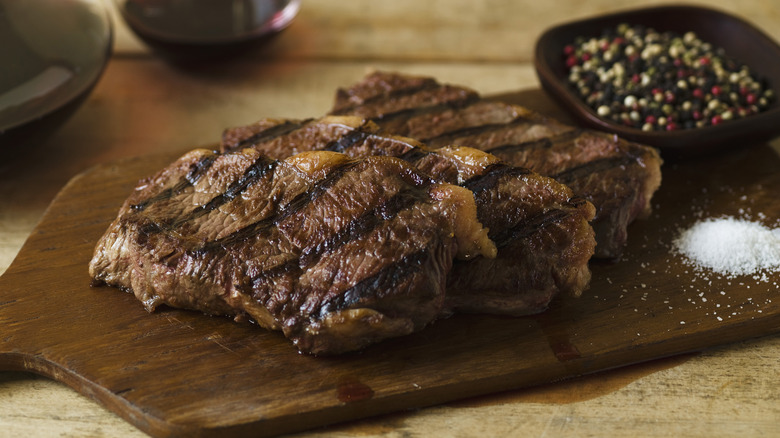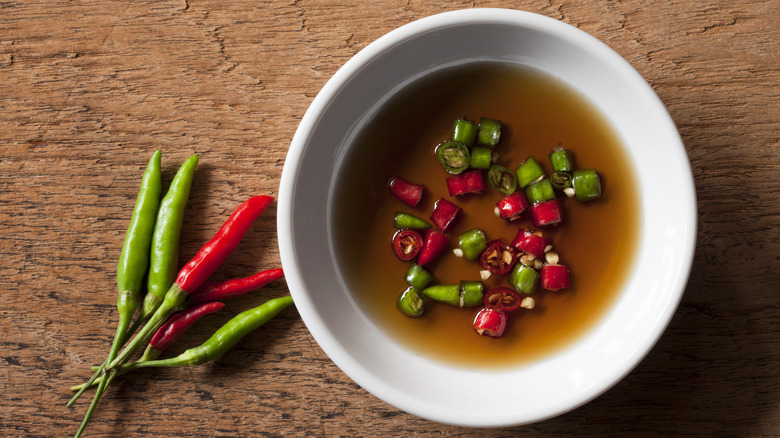Brine Your Steak In Fish Sauce And Thank Us Later
When it comes to cooking steak, the process is pretty straightforward: Season it, sear or grill it, and eat it. However, this simple approach shouldn't come at the expense of flavor. If you're consistently underwhelmed by the steaks you cook at home, you might need an extra ingredient or two to punch things up. To encourage the caramelized flavors achieved by the best grill masters, we suggest using a fish sauce brine.
Brining is a simple technique that helps meat stay juicy and tender, and it's also a great opportunity to add flavor. Brining makes for delicious baked potatoes, the best pork chops, and of course, perfect steaks. You can wet brine or dry brine meat, and at their most basic, wet brines are a mixture of salt and water that helps to tenderize the meat's fibers and infuse it with moisture. Many cooks add sugar, herbs, and spices to their brine, and while these are all great choices, fish sauce can add a stronger umami flavor with virtually no extra effort.
Before tossing your steak on the stove or grill, soak it in a simple, salty brine made with a few tablespoons of fish sauce. The concentrated liquid is made of fermented fish, usually anchovies, giving it a rich and dynamic brininess that's sweet, savory, and packed with umami. The sugar in the sauce encourages browning, while the meaty flavors complement the steak. You'll be rewarded with next-level steaks that have crusty exteriors and a deeply savory flavor.
Tips for brining with fish sauce
Many wet brine recipes call for anywhere from 1 to 4 tablespoons of kosher salt per cup of water. For a fish sauce brine, you'll be replacing the salt with the sauce, so you have some flexibility in terms of amount. Water and fish sauce alone make a great brine, but you might also choose to combine a single tablespoon of the sauce with another salty ingredient like soy sauce. Or, if you're aiming to add a high dose of salty-sweetness, use up to 3 tablespoons of fish sauce, dilute with water, and add a splash of honey.
If you're feeling ambitious, you can dress up your brine even more. Look to nuoc cham, a famously versatile Vietnamese dipping sauce, as a starting point. A typical recipe features fish sauce, sugar, water, lime, garlic, and chili peppers, and you can adjust the quantities based on your tastes. Just make sure there's enough liquid to submerge your steak. After you're finished cooking, mix up more of the dip to serve tableside to guarantee that each bite of meat is nice and juicy.
If you don't have time to brine, you can skip the soak and just coat your meat with fish sauce right before it hits the flame. Baste the steak with even more fish sauce as you grill for a nuanced char. Just remember that this ingredient packs a salty punch, so don't add more salt to your steak until you've tasted it.
Try a faux dry-age with fish sauce
When it comes to improving steak, brining is just the beginning. Clever home cooks can use the condiment for a shortcut version of dry-aged beef. Dry-aging, a technique popular at steakhouses, is when a portion of chilled beef is exposed to air for a prolonged period of time, encouraging more tenderness, deeper flavors, and better browning. The process adds a funky fermented note, and fish sauce can mimic this flavor, without the complications and long waiting time of true dry-aged steak.
It's easy to fake the texture and flavor of dry-aged steak by dry brining with fish sauce. Rub the beef with salt and refrigerate overnight to draw out moisture, then coat the meat with the fermented, fishy liquid before cooking. Or, brush the outside of the steaks with the condiment and place them in a sealed plastic bag to age in the refrigerator for a few days. This method isn't as similar to true dry-aging, but it might be better for cooks who are nervous about leaving uncovered steak in the fridge.
Once cooked, the faux aged steak should have a balanced, concentrated beefiness. However, if your umami experiment hits a sodium snag, don't fear. You can fix an over-salted steak with a water bath or a hit of acid, so keep some citrus handy to balance out the final taste if necessary.



